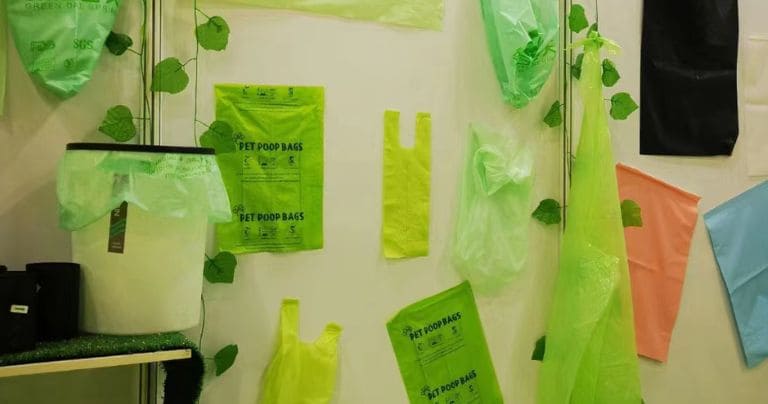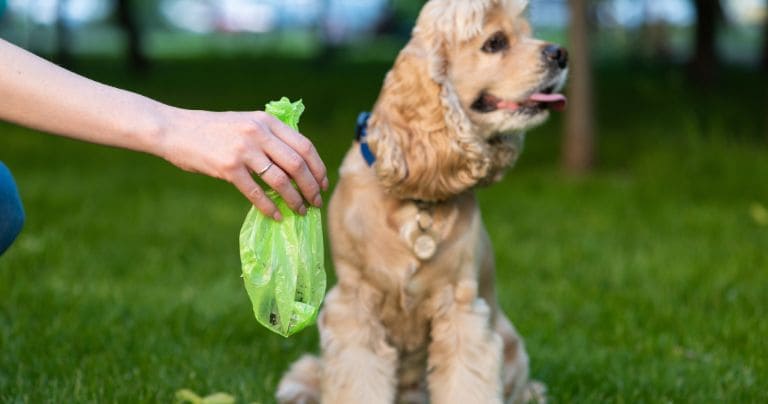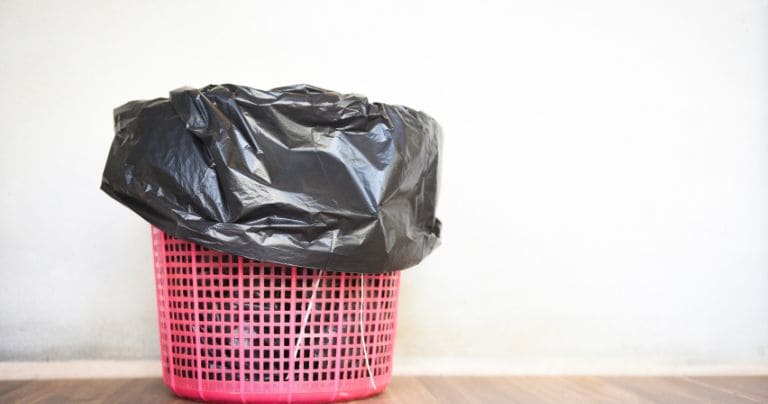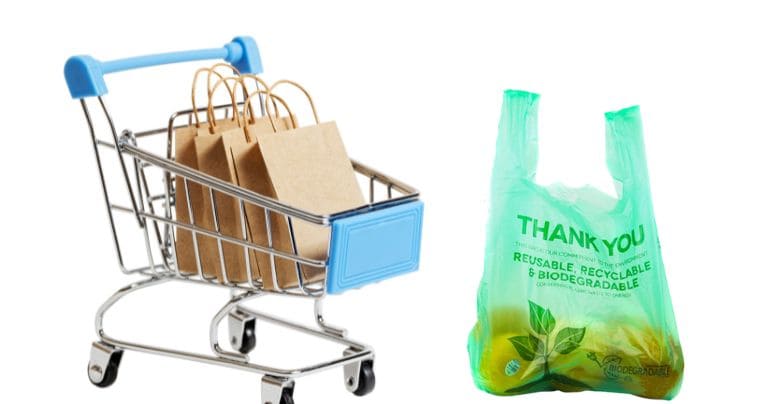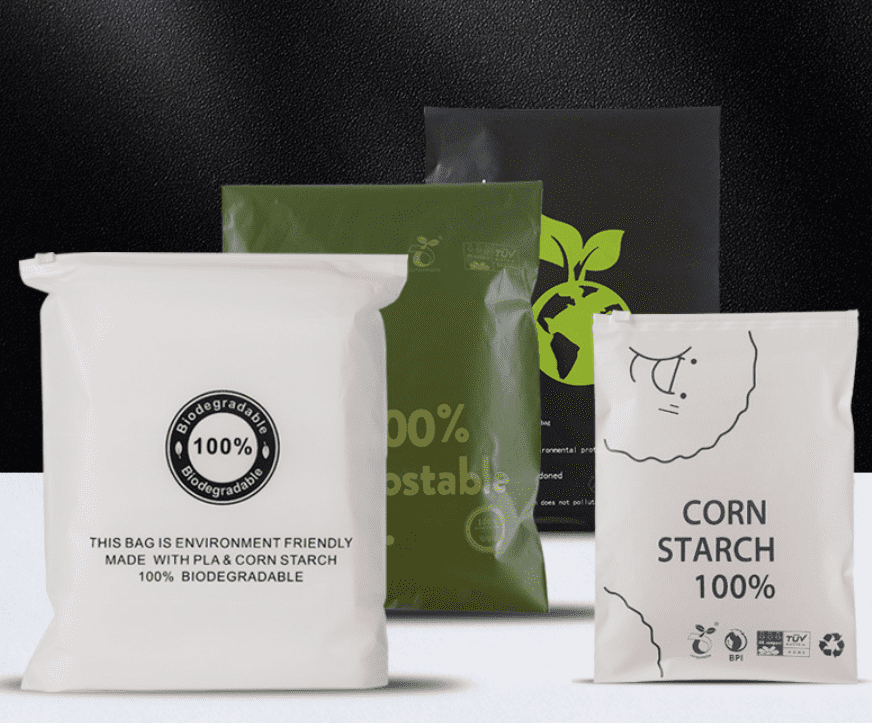Table of Contents
When considering the environmental impact of our daily choices, the question of compostable bags and their composition becomes crucial. As global awareness about environmental sustainability grows, individuals and businesses alike are seeking alternatives to traditional plastic bags. Compostable bags, touted as a green solution, have emerged as a popular choice. Their composition, derived from eco-friendly materials, promises a reduced carbon footprint, making their examination and understanding essential for a sustainable future.
No, compostable bags do not contain traditional petroleum-based plastic. They are made from plant-based materials such as cornstarch, potato starch and are designed to break down completely in composting conditions, leaving no harmful residues behind. However, it’s essential to ensure that the compostable bags you purchase are certified and meet composting standards, as there are products in the market that may not be truly compostable.
Want to know the real deal about compostable bags? Let’s dive in together and find out why they’re good for our planet.
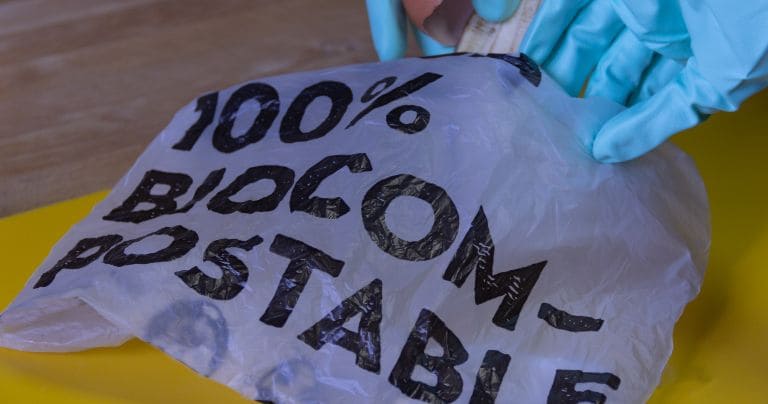
What Defines a Compostable Bag?
At first glance, compostable bags might seem just like your regular plastic bags. But dig a little deeper, and you’ll find they’re a game-changer in the world of sustainability. These bags, made from plants and other natural resources, promise a greener future. But how do they work, and are they truly as eco-friendly as they claim to be? Let’s dive in.
The Basics of Compostable Bags
Compostable bags are a breath of fresh air in a world drowning in plastic waste. Unlike traditional plastic bags, which can take hundreds of years to decompose, compostable bags are designed to break down much faster. They’re made from plant-based materials like cornstarch, potato starch, and even soy proteins. These materials are nature’s gift, ensuring the bags return to the earth in a more eco-friendly manner.
The Science Behind the Decomposition
The magic behind compostable bags lies in the microorganisms. Tiny creatures, like bacteria and fungi, munch on these bags, turning them into compost. This compost is a nutrient-rich, soil-like substance that plants love. So, in a way, these bags not only reduce waste but also give back to the earth.
Challenges in Composting
However, it’s not all rosy. The effectiveness of compostable bags depends on the composting environment. While they might break down quickly in industrial composting facilities, they might take longer in your backyard compost pile. It’s essential to understand where and how to compost these bags to ensure they don’t end up as litter.
Making the Right Choice
With the rising environmental concerns, choosing compostable bags seems like a step in the right direction. But it’s crucial to be informed. Ensure the bags you buy are certified compostable and not just biodegradable. Remember, every small step counts towards a greener planet.
In conclusion, compostable bags offer a promising alternative to traditional plastics. While they come with their set of challenges, being informed and making conscious choices can help us tread lightly on our planet.

How Do They Differ from Biodegradable Bags?
In the quest for eco-friendly alternatives, terms like “compostable” and “biodegradable” often pop up. While both sound promising, they’re not the same. The key difference? Compostable bags return to nature without a trace, while biodegradable ones might leave some unwanted souvenirs. Let’s delve deeper into their distinct characteristics.
Understanding Biodegradable Bags
Biodegradable bags are designed to degrade over time. Sounds good, right? But here’s the catch: while they do break down, they might fragment into tiny pieces called microplastics. These microplastics can linger in the environment, posing threats to marine life and even entering our food chain. The term “biodegradable” might sound eco-friendly, but the reality is a bit more complex.
The Promise of Compostable Bags
On the other hand, compostable bags are the true eco-warriors. Made from plant-based materials, they’re designed to be consumed by microorganisms. When composted correctly, they break down into water, carbon dioxide, and organic matter, leaving no trace behind. It’s nature’s way of recycling, turning waste into valuable compost that nourishes the soil.
The Importance of Proper Disposal
However, the effectiveness of both bags largely depends on how they’re disposed of. Compostable bags need specific conditions to decompose fully, often found in industrial composting facilities. Simply tossing them into the landfill won’t do the trick. Biodegradable bags, meanwhile, can degrade in various environments, but the risk of microplastics remains.
Making Informed Choices
With the environmental stakes so high, it’s crucial to make informed choices. When shopping for eco-friendly bags, look for certifications and labels. Understand the difference between the terms and choose products that align with your values and the available disposal methods in your area.
In conclusion, while both compostable and biodegradable bags offer alternatives to traditional plastics, compostable bags hold the edge in terms of environmental benefits. By understanding their differences and making conscious choices, we can pave the way for a cleaner, greener future.
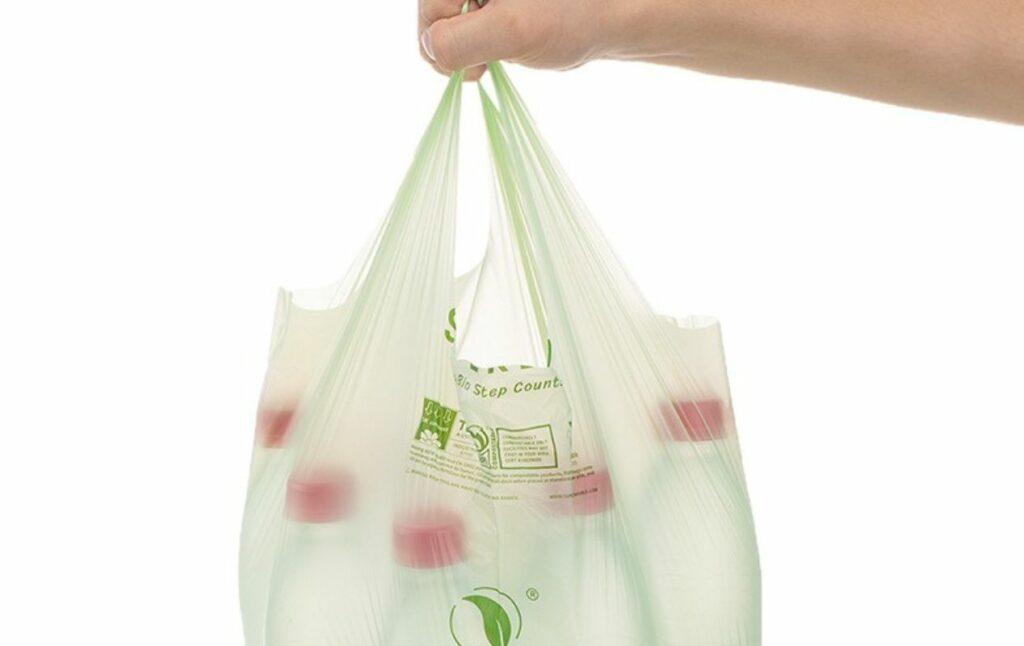
Why is There Confusion About Plastic in Compostable Bags?
The increasing demand for eco-friendly alternatives has led to a surge in the production and use of compostable bags. However, the presence of plastic in some of these bags has caused confusion and mistrust among consumers and businesses alike. The root of this confusion lies in the practices of certain suppliers and the lack of stringent regulations. Let’s delve deeper into the reasons behind this confusion and its implications.
Misleading Marketing Tactics
Some suppliers, in a bid to capitalize on the green movement, resort to misleading marketing tactics. They label their products as “compostable” even when they contain non-compostable materials, including plastic. This not only misleads consumers but also undermines the efforts of genuine suppliers.
Lack of Standardization
While there are certifications and standards for compostable products, the lack of a universal standard can lead to discrepancies. Different countries or regions might have varying definitions of what constitutes a “compostable” product, leading to further confusion.
Visual Similarities
Compostable bags often look and feel similar to traditional plastic bags. This visual similarity can make it challenging for consumers to differentiate between the two, especially if they are not well-informed about the specific materials used in the bags.
Challenges in Procurement
As mentioned, procurement officers, like myself, face challenges in ensuring the authenticity of compostable bags. With multiple suppliers in the market, each claiming their product to be genuine, it becomes a daunting task to verify each claim and ensure that the sourced bags are truly compostable and plastic-free.
Environmental Implications
The presence of plastic in compostable bags has severe environmental implications. When such bags are composted, they can leave behind microplastics that contaminate the soil and water, negating the very purpose of using compostable alternatives.
In conclusion, the confusion surrounding plastic in compostable bags stems from a combination of misleading practices, lack of standardization, and visual similarities with traditional plastic bags. It’s crucial for businesses and consumers to be vigilant, well-informed, and proactive in ensuring the authenticity of the compostable bags they use.

How to Ensure Your Compostable Bags are Plastic-Free?
In the quest for sustainability, businesses are increasingly turning to compostable bags as an eco-friendly alternative. However, ensuring these bags are genuinely plastic-free is crucial. While checking the composition and looking for certifications are essential steps, there are other measures businesses can take. Let’s delve deeper into the steps to ensure the authenticity of compostable bags.
Check the Composition
Genuine compostable bags typically have a composition of PBAT65+PLA5+MD30. It’s vital to verify this composition, as any deviation might indicate the inclusion of non-compostable materials or plastics. Always ask for detailed material specifications from the supplier.
Certifications Matter
Certifications play a pivotal role in validating the compostability of bags. These certifications ensure that the bags adhere to specific composting standards set by recognized bodies. Look for logos or stamps on the bags or packaging that indicate they have been certified.
Supplier Reputation
The reputation of your supplier can’t be overlooked. Always source your compostable bags from reputable suppliers with a track record of delivering authentic products. Checking reviews, testimonials, and seeking referrals can provide insights into the supplier’s credibility.
Demand Transparency
A genuine supplier will always be transparent about the materials used in their compostable bags. If a supplier hesitates to share detailed information or provide material specifications, it could be a red flag. Businesses should prioritize transparency and open communication when sourcing these bags.
Consider Lab Testing
If there’s ever a doubt about the authenticity of the compostable bags, consider getting them tested in a laboratory. Lab tests can determine the compostability of the bags and identify the presence of any plastic or non-compostable materials. While this might be an added expense, it provides peace of mind and ensures you’re getting genuine products.
In conclusion, ensuring that compostable bags are genuinely plastic-free requires diligence, Research, and sometimes even third-party verification. By taking these steps, businesses can confidently promote their eco-friendly initiatives and contribute to a more sustainable future.
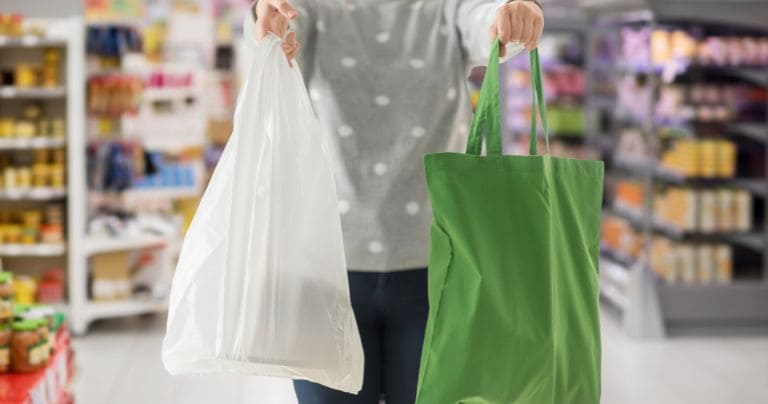
What are the Challenges Faced by Businesses Using Compostable Bags?
Compostable bags, hailed as an eco-friendly alternative to traditional plastic bags, are not without their challenges. While they offer a sustainable solution, businesses often grapple with issues that arise from their use. One significant concern is the contamination of recycling streams. But what other challenges do businesses face when integrating compostable bags into their operations?
Contamination of Recycling Streams
As you rightly pointed out, if compostable bags end up in recycling bins, they can contaminate recyclable materials. This mix-up can render an entire batch of recyclables useless, leading to wastage and defeating the purpose of recycling.
Consumer Awareness and Education
Many consumers are unaware of the differences between compostable, biodegradable, and recyclable materials. Educating them on proper disposal methods becomes a responsibility for businesses, adding to their outreach efforts and costs.
Higher Costs
Compostable bags, being made from plant-based materials, can be more expensive than regular plastic bags. This cost difference can impact businesses, especially those operating on thin margins.
Storage Conditions
Compostable bags have specific storage requirements. Exposure to moisture or high temperatures can start the decomposition process prematurely, making them unsuitable for use.
Limited Composting Facilities
Not all regions have industrial composting facilities equipped to handle compostable bags. In areas without these facilities, the bags might end up in landfills, where they won’t decompose as intended.
Regulatory Challenges
Different countries and regions have varying standards and definitions for what constitutes a “compostable” material. Navigating these regulations and ensuring compliance can be a challenge for businesses operating in multiple regions.
Performance and Durability
While advancements have been made, some compostable bags might not be as durable as their plastic counterparts. This can lead to concerns about the bag’s ability to hold weight or withstand certain conditions.
In conclusion, while compostable bags present an eco-friendly alternative, businesses need to be aware of the challenges associated with their use. By understanding these challenges, businesses can make informed decisions, ensuring that their shift towards sustainability is both effective and efficient.

Conclusion
In conclusion, while there are compostable bags that contain no plastic, it’s essential to be vigilant and ensure you’re sourcing authentic products. By doing so, we can make a significant difference in reducing plastic waste and promoting a sustainable future.
